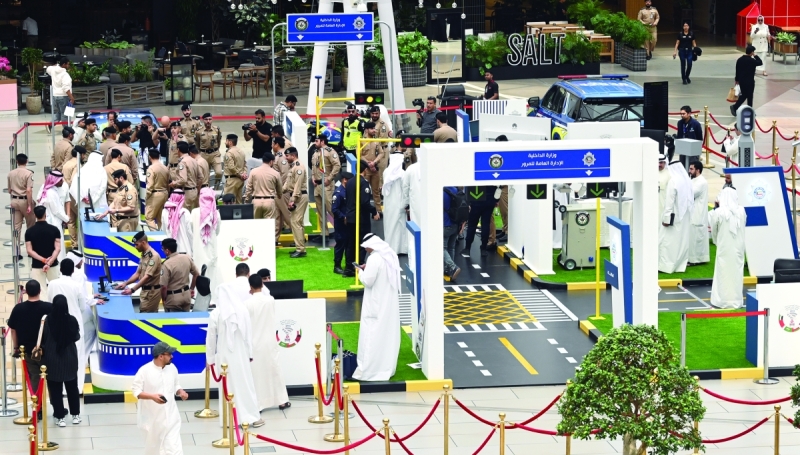The Ministry of Interior has announced that the new traffic law, set to take effect on the 22nd of this month, will be enforced firmly and without leniency, especially in cases involving serious violations that may lead to fatal accidents. This was confirmed by Interior Ministry Undersecretary, Lieutenant General Sheikh Salem Al-Nawaf, who stressed that the law includes the strictest penalties for severe breaches. However, he noted that a “reconciliation order” would be applicable to certain minor violations, viewed from a humanitarian angle.
Lieutenant General Al-Nawaf made these remarks during the 38th Unified Gulf Traffic Week, held under the slogan “Driving… Without a Phone,” at the Waldorf Astoria Hotel in The Avenues Mall. The event was held under his patronage and was attended by senior security officials, including Assistant Undersecretary for Traffic and Operations Affairs Major General Yousef Al-Khudda.
Al-Nawaf urged all drivers to strictly adhere to the provisions of the traffic law to ensure their safety and the safety of others. He highlighted that the new law includes a set of amendments aimed at enhancing road safety and ensuring better compliance with traffic regulations.
Objectives of Gulf Traffic Week
Speaking at the opening of Gulf Traffic Week, Lieutenant General Al-Nawaf emphasized that the initiative aims to raise traffic awareness, foster a culture of law-abiding driving, protect lives and property, and encourage safe driving habits across Gulf communities. He also conveyed the greetings and support of Acting Prime Minister Sheikh Fahad Al-Yousef to all attendees, wishing success for the event and its goals.
Al-Nawaf described the Gulf Traffic Week as a vital platform for strengthening cooperation between security agencies and the community, contributing to a reduction in traffic accidents and building a more disciplined and secure traffic environment. He concluded by extending his heartfelt thanks to all organizations involved, expressing hope that the efforts would yield positive outcomes for Kuwait and its citizens.
Call for Collective Responsibility
Brigadier Jamal Al-Foudari, Director General of the General Traffic Department, emphasized the importance of community involvement in addressing traffic challenges. He stressed that minimizing road fatalities caused by violations can only be achieved through coordinated efforts across public and private sectors. These institutions must actively participate in spreading awareness from within and across the wider society.
He added that this year’s Gulf Traffic Week slogan reflects the spirit of unified Gulf cooperation in traffic awareness, underscoring the need for a shared vision focused on saving lives.Stay updated on Kuwait’s latest news and job openings by following our WhatsApp channel! https://whatsapp.com/channel/0029VaCkXo25q08jnKrRwo27
Brigadier Al-Foudari noted that the upcoming phase of enforcing the newly amended traffic law presents an opportunity to raise awareness and significantly reduce accidents and fatalities. He said modern technology and digital tools would be used across all traffic-related services to achieve these goals.
Efficient Monitoring with ‘Rasid’ Cameras
Lieutenant Colonel Abdullah Bu Hassan, Assistant Director of the Traffic Awareness Department, confirmed that the newly installed “Rasid” cameras are functioning with high efficiency. These cameras are strategically placed in areas prone to speeding and traffic accidents. Notably, the cameras are battery-operated, making them suitable for use on external roads lacking lighting infrastructure.
He added that all violations recorded by these cameras undergo verification after periodic system scans, ensuring accurate enforcement of the law.







